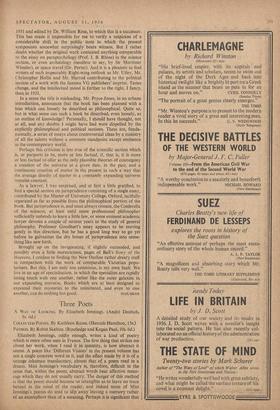Expanding Universe
THE NEW OUTLINE OF MODERN KNOWLEDGE. Edited by Alan Pryce-Jones. (Gollancz, 18s.) IT would take a Schopenhauer, the last, so I have always been assured, of the serious pretenders to universal learning, to review a book like this, a volume of some six hundred pages, by about twenty-five separate authors, and laying claim to be an outline of modern knowledge.
It is a long time since I saw the original work, published in 1931 and edited by Dr. William Rose, to which this is a successor. This has made it impossible for me to verify a suspicion of a considerable shift in the public taste to which the present symposium somewhat surprisingly bears witness. But I rather doubt whether the original work contained anything comparable to the eisay on parapsychology (Prof. J. B. Rhine) in the science section, or even archeology (needless to say, by Sir Mortimer Wheeler), or space travel (Dr. Porter). And it is a pleasure to find writers of such impeccably Right-wing outlook as Mr. Utley, Mr. Christopher Hollis and Mr. Harrod contributing to the political section of a work with the famous VG publishers' imprint. Tastes change, and the intellectual mood is further to the right, I fancy, than in 1931.
In a sense the title is misleading. Mr. Pryce-Jones, in an urbane introduction, announces that the book has been planned with a bias which can loosely be described as philosophical. Quite so, but in what sense can such a book be described, even loosely, as an outline of knowledge? Personally, I should have thought, not at all, and any doubts I might have had were dispelled by the explicitly philosophical and political sections. These are, funda- mentally, a series of essays about controversial ideas by a ministry of all the talents without a common standpoint except eminence in the contemporary world.
Perhaps this criticism is less true of the scientific section which is, or purports to be, More or less factual, if, that is, it is more or less factual to offer as the only plausible theories of cosmogony a creation of the universe at a given date, in the past, and a continuous creation of matter in the present in such a way that the average density of matter in a constantly expanding universe remains constant.
As a lawyer, I was surprised, and at first a little gratified, to find a special section on jurisprudence consisting of a single essay, contributed by the Master of University College, Oxford, tactfully separated as far as possible from the philosophical portion of the Kook. But jurisprudence is, and must always remain, the Cinderella of the sciences, at least until some professional philosopher sufficiently unbends to learn a little law, or some eminent academic lawyer devotes a couple of serious years to the study of general philosophy. Professor Goodhart's essay appears to be moving gently in this direction, but he has a good long way to go yet before he galvanises the dry bones of jurisprudence into some- thing like new birth.
Brought up on the invigorating,, if slightly outmoded, and possibly even a little meretricious, pages of Ball's Story of the
Ileavens, I confess to finding the New Outline rather dreary stuff in comparison with the work of comparable Victorian popu- larisers. But this, I am only too conscious, is my own fault. We



































 Previous page
Previous page